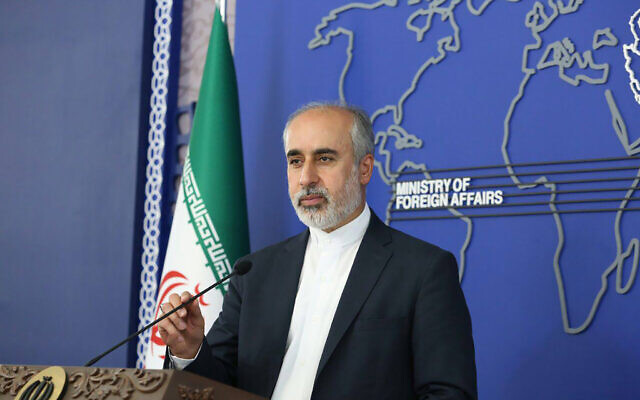In a tit-for-tat measure, Iran on Wednesday blacklisted several EU individuals and media outlets in retaliation for the bloc’s punitive measures on police over a crackdown on Mahsa Amini protests.
The move comes after the EU last week imposed fresh human rights sanctions against the morality police and 11 officials including Iran’s telecommunications minister, accusing them of involvement in repressing the protests.
Among those sanctioned were also Iran’s information minister, the cyber division of the Revolutionary Guards and a uniformed branch of the national police.
Street violence has rocked the country since Amini’s death on 16 September, three days after she was arrested by the morality police for allegedly violating the Islamic republic’s strict dress code for women.
Dozens of people, mainly protesters but also members of the security forces, have been killed during the unrest. Hundreds more, including women, have been arrested.
In a statement on Wednesday, Iran’s foreign ministry announced sanctions against eight institutions and 12 individuals based in the EU for “supporting terrorist groups”, “inciting violence” and “provoking riots, violence, and terrorist acts” in the Islamic republic.
The Iranian measures mark the first time Tehran has officially sanctioned EU officials and institutions.
“If Europe believes that by imposing sanctions against Iran it can obtain advantages in the talks, this indicates that it has no knowledge of Iran,” said Abolfazl Amouei, the spokesman of the National Security Committee of the Iranian Assembly, quoted by Irna state news agency.
Amouei called the measures a “proportional” response to the EU’s “hostile gestures”.
The targeted entities include the Friends of Free Iran and the International Committee in Search of Justice, two informal groups in the European Parliament.
Although the Iranian blacklist includes European and French politicians, such as predominantly centre-right to far-right European parliamentarians or former parliamentarians, it does not target high-level EU officials.
It includes seven organisations and entities based in France and Germany: the International League against Racism and Anti-Semitism, two individuals at the German tabloid newspaper Bild as well as the Persian versions of German broadcaster Deutsche Welle and Radio France Internationale for what Tehran sees as promoting “terrorism” on Iranian soil.
In addition, the Karl Kolb and Rhein Bayern Fahrzeugbau companies were blacklisted for “delivering chemical gases and weapons” to former Iraqi ruler Saddam Hussein, who is said to have used them against the Islamic Republic during the 1980s.
The Iranian sanctions include a visa ban and the “seizure of their property and assets in the territory under Iran’s jurisdiction”, the ministry statement said.
Earlier this week, Tehran already announced measures against several British individuals and entities.
Separately, EU member states last week also agreed on sanctions against three individuals and one entity for supplying Iranian drones that have been used by Russia to bomb Ukraine in recent weeks.
Also last week Thursday, it will be recalled, EU member states agreed on fresh sanctions against three individuals and one entity for supplying Iranian drones that have been used by Russia to bomb Ukraine in recent weeks.




